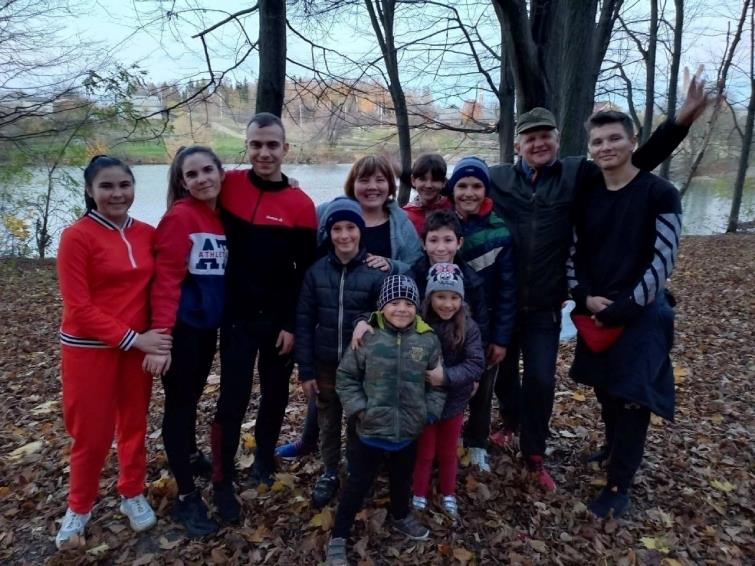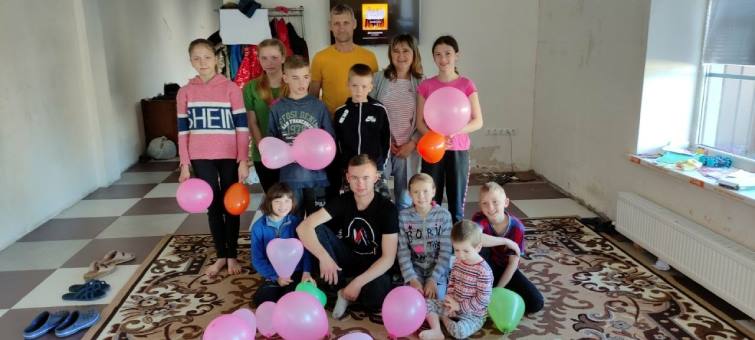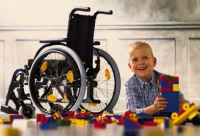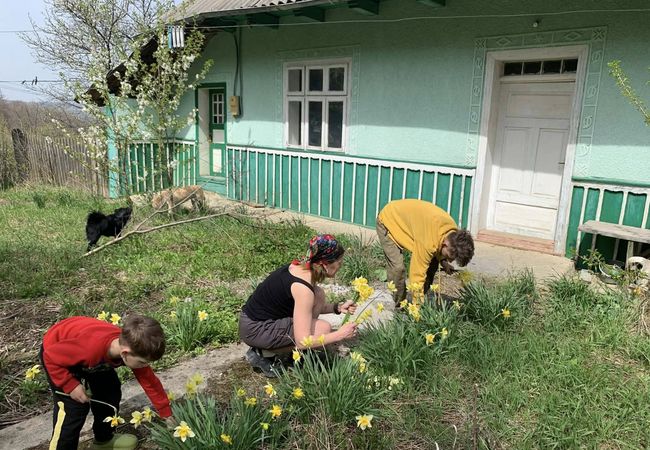
According to the Ministry of Integration, more than 4.8 million Ukrainians became forced migrants as a result of ussia's full-scale war against Ukraine. It is only about those citizens who submitted official applications for registration.
It is especially difficult for large families at this time. "Let's hide!" - two words that children used in the game a year ago, and now have become the personification of fear that the next "arrival" and "bang" will be for them.
Families from Kherson region, Kharkiv region and Luhansk region told "Ukrainian truths. Life" about the difficulties they overcome during the war.
The Somovyh family
The children of Zhanna and Oleksandr Somovyh's family-type children's home escaped from their occupied hometown of Beryslav in the Kherson region at the beginning of April.
Zhanna says that the screams of younger children can still be heard from time to time when the shelled. Now the family lives in Monastryshchi, Cherkasy region.
The woman talked about how they manage their lives, thanks to whom and why they keep up. Next is her direct speech.

Zhanna and Oleksandr Somov
Eight children are under our protection: 3 girls and 5 boys. The oldest is Oleksandr. He is 17 years old. Diana is 14, studying in the 9th grade. Danilo, her brother, is 11, he is a fifth-grader. Their younger sister Karina is 8 years old, but she is only in first grade due to developmental issues. And the youngest Nikita is 6, he is also a first grader. Sofia – 11, Kirill – 9, Artem – 10.
We also have a common son Oleksandr, he is 22 years old. He is currently helping to repair cars for the Armed Forces.
In Beryslav, before the Great War, in addition to raising children, I sewed toys in my spare time. The man was a private entrepreneur.
Earlier we had two more girls. They are already married. One of them lives in Ternopil. Recently, she came to visit with baby and chosen one for the New Year holidays. Another married a priest here in Monastryshchi. She had a mental disorder since childhood, so before the holidays she went to the town of Smila for treatment. There she was advised to go through a period of adaptation with the family where she lived. So we were increased again.
I remember well, we left Beryslav on April 7. It was very "hot". Due to regular air raid signals, I had to constantly sit in jackets: sometimes I went down to the basement, then we ran to the bomb shelter of the plant. So all the time back and forth.
The main reason for our evacuation was the fright of the children. Due to constant stress, the younger ones began to uncontrollably "walk" under oneself. We could not psychologically cripple children like that.
"Good" people had to ferry us across the checkpoint. However, after waiting for two hours to no avail, we decided to go at our own peril and risk.
The whole family went. This is my brother, who also has a family-type family. They also took my mother and grandfather away. There were four cars. We left the city in the morning. The first point was the city of David's Brid. It is 50 km away. This short distance took 8 hours. Children were very "sick" on the way.
They reached Kropyvnytskyi around 12 midnight. We were met there and admitted to the hospital. It was most scary for the little ones, because the older ones already more or less understand the situation. When they bombed, the smallest panicked, shouted at the top of their lungs: "Let's hide!"
The next morning we went to Monastirishch. We had a choice of three roads: Monastirishche, Katerynopil and Ternopil. There are relatives both there and there, but they stayed in Cherkasy. After all, it is closer to the Kherson region.
We rent a house. However, all the children sleep in the same room. The accommodation is small, only 3 rooms: 2 separate for sleeping and one dining room. So we redid the kitchen, made a separate room for the oldest. The biggest problem is water. It is not in our well. We have to run to the neighbors and guys working at the base with bottles and eggplants to provide for our big family.
After us, many residents of Berislav evacuated here. Local volunteers and teams of the "Zaporuka" and "Khvylia Dobra" charitable foundations help resettled compatriots to find housing, necessary things, and settle down.
And our new neighbors-grandmothers always ask if we need anything. Fortunately, everything is enough. This year, 350 bushes of tomatoes, cucumbers, and potatoes were planted. The harvest turned out to be not bad - 800 kg. They made a spin for the winter. So we are not afraid of hunger.

The Somovy family
My husband's sister and father remained in our house, in the Kherson region. Unfortunately, they could not leave due to their health. And it hurts us a lot.
Before the new year, my husband went home to pick up bunk beds for the kids, because we had been sleeping on mattresses for 8 months. I asked him to leave the icon of the Mother of Seven Arrows in the house as a talisman.
We have a truck. We managed to get her out of there. And also "bobyk". We are just repairing it and will give it to our guys on the front line.
We miss Berislav very much. For 31 years of living together, we and her husband tried to do everything possible for the children: the yard was paved with cobblestones, a playground with turnstiles, and a gazebo for relaxation were built. My father is buried there. I have not been able to visit his grave for almost a year.
Children feel everything and also want to go home. When Oleksandr, my husband, brought the carpet from home, our youngest immediately recognized it, he was incredibly happy that something familiar was now with him. And I, too, when I look at that carpet, I can hardly restrain myself from crying. We are alive and well, relatively safe. And after our victory, we will spread our carpet again on the floor in our native house.
Trokhymchenko family
Olena and Oleksiy Trokhymchenko from Chuguyev in the Kharkiv region are raising 10 adopted children. Back in 2006, the married couple organized a family-type orphanage.
At the end of March 2022, the family was evacuated to Pokrovsk, Poltava Region. The local community allocated space for a large family in an unfinished building, because ordinary houses did not fit in terms of area. And here are as many as 300 "squares"! So it was necessary to equip the former sawmill, which the owners began to rebuild into a hostel and cafe for seasonal workers.
The new residents quickly made their home comfortable. As Olena's mother says: "We are used to it." They replaced the old boiler, hung curtains, threw cheerful rugs on the floor, and hung up the TV. The community helped with food, clothes, and household items. The "Zaporuka" charitable foundation helped to overwinter by bringing firewood and giving each family member a new blanket.
Olena Trokhymchenko, the mother of the family, told why the former pupils stay together and how they adapt to a new home and life in the status of forced migrants. Next is her direct speech.

Olena Trokhymchenko
Our big family started with our own son Stanislav. He is now 29. Once I took him with me when I worked in a children's camp. My pupils were children from 6 to 16 years old, whom we called "nesting". All of them grew up without a family, but they really wanted to have one, that's why they twisted a nest for themselves somewhere from everything they saw. They tried to make up for what they never had - home comfort.
Among them, 9-year-old Dmytryk stood out as particularly defenseless. He did not have any documents. For a while we called him "Nichiy". One day my son came up to me and said: "Mom, let's take Dimka for ourselves?". I say: "How will we take it away? He is not a thing - a living person." But this thought stuck in my head.
A year later, we and her husband registered a family-type orphanage. Dmytryk became our "firstborn".
Now he is serving. He has two daughters, our granddaughters. They are also near us. In general, all our former pupils stay with us with their own families.
During the entire existence of the house, we raised ten children. Ten more currently live with us.
We have three Annas. Senior 17. Studying to become a pastry chef. Middle Anna is 16 years old. She is in the 10th grade. Her 11-year-old sister Nastya and 13-year-old brother Sashko are also among our pupils.
The third Anna, the youngest and most active, is in the sixth grade. Attends all the clubs that are in the school. But the favorites are tourism and football. Maksym studies in the same class with her, he loves to dance. Before he came to us, the teachers complained a lot that the boy did not study well. Everything changed when he became "ours".
Anya has a younger sister, Violetta, who also lives with us. A girl with a disability. But now she is already starting to write and count. Maybe even up to a hundred.
Another of our adopted boys, Pavlo, is 11, and our adopted daughter, Yuliana, is 14. For the girl, her older sister, a student at a pedagogical university, is a great authority.
Mykolka, the youngest, is 4 years old. Everyone likes to play with him. So he's a bit of a mazunchik.

The Trokhymchenko family
Before the war, we lived in the village of Lebyazhe, in a very nice place overlooking the Siverskyi Donets. On the one hand, there is a pine forest. On the other side – the Pecheneg Reserve. On February 22, they finally finished the renovation in the new bright house with large windows. They stretched the ceilings, re-glued the wallpaper, made a warm floor and... the war began.
At first, none of the people thought of leaving their homes. Everyone was sure that we would be able to somehow survive this calamity at home. Even when they said they might blow up the dam and flood the village, our family decided to move to higher ground but stay. We lived in two houses for a month, because pigs, kittens, chickens, and dogs were waiting for us at home.
It is buzzing around, and we are running here and there. At some point I fed up. We returned. But after a couple of days, the light, water, and then the connection disappear. However, this has not yet become a red line for us. There is gas, the well is outside - somehow we will survive.
Without the connection, every morning began with a visit to the village council to understand what kind of world we are in. That's where they once heard from the head: "Girls, bake more bread, because soon there will be no gas." For me, who knows well what it is like to feed ten or even more people, this was a real red line. We decided to leave.
The night before the evacuation, my husband and I could not sleep for a long time - it was very quiet. Until finally it started to bang. That's when we calmed down. Those who have lived under shelling for a long time understand why. Silence is the unknown. And when you hear where and with what they are shooting, it is as if you are in control of the situation.
They left in two cars. There was no final destination. We went to the friends of our eldest son Serhii, who recently started living on his own.
The move was not a shock for us. Because we were preparing. On the one hand, even before the war, social services taught how to behave in crisis situations. From the second, we always traveled a lot as a family, so we understood how to stay organized and what to take with us. This time I had one suitcase with documents with me.
The children perceived the trip as an adventure. Thank God, they left peacefully. If we were delayed for at least one day, it would be bad. Neighbors said that the next day terrible shelling began.
So we ended up in Poltava Oblast. In a community of kind, friendly people who have not left us alone with our problems since we arrived here. They share everything. Products, clothes. They do not take money for housing.
Our house in Lebyazhem is standing, although the neighbors say a shell flew into the yard. The roof, the barn was cut off, almost all the windows were broken. The hundred-year-old oak, which we have near the house, was also hit, but survived. And we will stand. We hope to return this year. We miss our relatives.
The Kozyuberd family
The large Kozyuberd family from the Luhansk region found shelter in Obukhov, Kyiv region. After 5 months in the occupation, the family took a long time to recover and finally settled down.
Schoolchildren resumed their studies, made new friends, attend sports classes and a computer club. It is not without difficulties, because stable employment is not yet settled, and relatives - elderly parents and sister - remain in Starobilsk, and contact with them can be once a week at best.
But, as Lyubov says, life goes on and you have to live it. The woman told what it's like to be forced migrants and not know what's going on with your native home.

The Kozyuberd family
We are from the village of Vyshnevo, Starobil District, Luhansk Region. We have 7 children. The eldest daughter Victoria is 22 years old, Vitaly is 20 years old, Diana is 18 years old. Oleksandr, who has Down syndrome, is 16, Oksana is 12, Snizhanka is 10, and the youngest, Olena, is 8.
The man worked as a construction worker for 17 years. I usually looked after and raised the children. Sometimes she also worked on construction sites.
They dreamed of buying a house all their lives. We lived in the village and wanted to move to the city because we always worked there. On February 23, they bought a house in Lysychansk. Our dream disappeared with the beginning of the war. When we first moved out, there was a neighbor who sent us photos of the house. We know that the windows were blown out, because a a projectile hit in the house nearby. Now everyone has left, so we don't know what happened to our house.
We lived under occupation for almost 5 months. While living there, they were constantly worried about the children. At first there were shellings, hiding in basements.
Then the patrols began - they were looking for policemen and soldiers. Armed soldiers came to us with searches. They looked into every corner of the house. They asked where our eldest daughter Victoria is, who works in the police. We lied that she went abroad a year ago so that they would stop looking for her.
They waited under the yards at night. It was not possible to leave the house. One day the man went outside and came back all pale. The occupiers threatened him not to go out again.
They evacuated on July 12. Daughter Victoria helped us. She left for Dnipro and was waiting for us. We didn't leave for a long time because we persuaded my husband's parents and sister to evacuate. Failed. Then the headmaster of the school asked to write a statement to the so-called "LPR". We refused.
In a week, they sold all the things from the house to have money for the road. Then they hired carriers and got out through the Pecheneg crossing on foot.
They drove at their own risk. We were worried that they might will not miss the men . Vitaly was 19 at the time, and my husband was also liable for military service. We were traveling in two cars: a man with children in a bus, and I in a car. It was scary.
At first they didn't want to release it. I had to leave by deception: the husband said that he needed an operation, because a year ago he had a heart attack, and the children needed to be taken to their mother.
It is difficult and expensive to find housing for our large family. At first, we rented a house in Dnipro. Then they moved to Cherkasy region. Later they found a place in the Kyiv region in the village of Krasne Pershe. There was a very small house - two rooms. Now we moved to Obukhov. We rent a 3-room apartment here. We are looking for a job.
We came with summer clothes. Thanks to benefactors, in particular the "Zaporuka" charitable foundation, they were able to dress everyone in already warm clothes. We get the necessary grocery sets, hygiene products for the whole family.
Missing home. The usual life, relatives of the husband, who remained there. We call them once a week. They live in Starobilsk. Communications are constantly cut off in the city, so they have practically no connection.
We do not have enough work, earnings to support the family. I want to pamper the children sometimes... Now they are fully dressed, we have bought stationery for our schoolchildren. But the phone is junk, so three girls have to study remotely from one.
We cope somehow, because we understand that there are families who have a much harder time.
We like Obukhov, it is nice and clean. I like that children have many opportunities to go to different clubs. We also got to know immigrants from Kharkiv. Our two girls go swimming. Another daughter was enrolled in IT courses. Children are satisfied.
Once when we wanted to get a job at the factory, we were asked why we communicate in Ukrainian, even though we are from the Luhansk region. We did not understand this, because we are also from Ukraine, we know and speak Ukrainian. And so everything is normal.
***
The heroes of the material receive help within the framework of the RELIEF humanitarian support project of the "Zaporuka" charitable foundation in partnership with Soleterre Onlus, funded by the Italian Agency for the Development of Cooperation AICS.
"RELIEF in translation means relief. This is our main task. To strengthen the most necessary, so that people feel that they are not abandoned, that we are all together. Local communities have become real points of support for those who were deprived of the most important things by the war: homes, the opportunity to work , ordinary life, social circle," says Nataliya Onipko, the founder and president of "Zaporuka".



